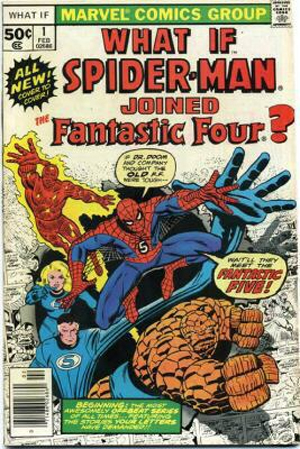Growing up, I remember reading comic books that went something like this:
“What if Spider-Man joined the Fantastic Four?”
The premise of these books was to take an idea that was pretty solidified in the comic book world (e.g. there were four members of the fantastic four, and Spider-Man was not one of them), and then ask “what if” things had been different. These “what if” books were always fun for me as they were self-contained (one book, one story), and they exposed you to an alternate reality – what could have been. They got your creative juices flowing.
In healthcare, there are quite a few moments in history where for a moment I think it is interesting to ask “what if?”
In 1938, President Franklin Roosevelt’s technical committee on medical care released a report – “The Need for a National Health Program.” This report came out of a decision by the President to not propose a medical care program as part of Social Security. Rather, the President wanted to study the impact of a federal healthcare program on the country. So in 1935 he established the Interdepartmental Committee to Coordinate Health and Welfare Activities as an ad-hoc group to further examine the issue of healthcare. Much of this report can be found online for those interested reading through it in its entirety.
There are many interesting sections of this report worth reading, but I would remiss to not thank the brilliant Tom Sherlock for his pointing this report out to me. (Tom is writing a book that, while focused on Colorado healthcare, includes national and international developments in healthcare policy. This book, Colorado’s Healthcare Heritage: A 19th and 20th Century Chronology, promises to be a juggernaut. Look for more on this amazing resource here).
First, the Committee “calls attention to the fact that illness precipitates large costs and enormous economic burdens, and that sickness is among the most important causes of economic and social insecurity.” While much of this may be common sense, the fact that we were talking about the cost of health really before healthcare became the uncontrollable cost beast that it is now, I believe is what literary professors call “foreshadowing“. This Committee knew that someone had to be more involved in “sick care” and act accordingly as to mitigate the effects of sickness on larger country.
They continue: “Sickness strikes at the basis of national vitality; the good health of the population is vital to national vigor and well-being.”
They recognized that a healthy country was more productive, which of course was of great concern to them at this time in our nation’s history (unemployment at this time was 19%). And I think some of what you see in the report reflects their struggle to know how much government should be involved in healthcare – not if government should be involved but how much government should be involved as seen below in my second point.
Second, the report makes five recommendations back to the President and the government:
1) An expansion of public health and maternal and child health services under existing titles of the Social Security Act.
2) Federal grants-in-aid to the states for the construction of hospitals and for defraying operating costs during the first three years.
3) Federal grants-in-aid to the states toward the costs of a medical care program for medically needy persons.
4) Federal grants-in-aid to the states toward the costs of a general medical care program.
5) Federal action to develop a program of compensation for wage loss due to temporary and permanent disability.
Third, the reasons healthcare was not changed back then are not so different from some of the reasons we do not see comprehensive healthcare change now (e.g. competing interests, opposing business models, politics). These recommendations were also likely never adopted as physicians, employers and insurance companies (looking into healthcare) also opposed it. If you want to see how special interests and certain guild groups and organizations fought against healthcare throughout history, read anything by Paul Starr. Please read anything by Paul Starr – trust me – you will be better off for it.
What’s most interesting is that during the 30s, and 40s, our predecessors did high-quality studies on same healthcare issues that we’re facing today. If you read the report, what may surprise you is how they wrote precisely, concisely, and boldly about issues and possible solutions for healthcare. It also appears that there was very little technical jargon and political posturing on their part in this report – they wanted to do something about healthcare:
“The accomplishments of the past in health conservation are therefore secondary to the needs of the present and of the future. While great advances have already been made, enormous needs still prevail. The amount of preventable sickness and disability which continues, the volume of unattended disease, the rate of premature mortality and the prevalence of avoidable economic burdens created by sickness-costs, justify grave concern.”
Could this statement written 70+ years ago not still apply today?
So what if?
What if there had been a general medical program created back in the 30s for the country? Where would we be now? What if we had really tackled comprehensive healthcare and gotten outside some of the major political issues?
With major decisions around the Patient Protection and Affordable Care Act being decided upon by the Supreme Court now, it may be best to not focus on the what if, but go ahead and start planning for the why not?
“What if?” was a great comic book series, but as it turns out, “what if?” doesn’t really work well with thinking about healthcare. We have major decision points that we need to make now, and I for one don’t want the next generation to look back on our decisions and say “what if?”
I mean after all, there was a reason the “What if?” series was never as popular as other comic books.
And everybody knows Spider-Man was not in the Fantastic Four…

